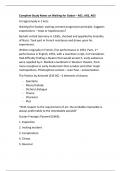Complete Study Notes on Waiting for Godot – A01, A02, A03
A tragicomedy in 2 Acts.
Waiting (for Godot): waiting: present progressive participle. Suggests
expectations – hope or hopelessness?
Beckett visited Germany in 1930s, shocked and appalled by brutality
of Nazis. Took part in French resistance and draws upon his
experiences.
Written originally in French, first performance in 1953, Paris. 1 st
performance in English, 1955, with a rewritten script, not translation.
Had difficulty finding a theatre that would accept it, early audiences
were repelled by it. Marked a landmark in Western theatre. Paris
more receptive to early modernism than London and other major
metropolitans. Philosophical context – Jean Paul – existentialism.
The Poetics by Aristotle (335 BC) - 6 elements of drama:
- Spectacle
- Music/melody
- Diction/ dialogue
- Theme
- Character
- Plot
“With respect to the requirement of art, the probable impossible is
always preferrable to the improbable possible”
Gustav Freytag’s Pyramid (1863):
1. Exposition
2. Inciting incident
3. Complication
4. Climax
5. Reversal
, 6. Falling Action
7. Resolution
8. Denouement (final revelation)
‘Theatre of the Absurd’ Essay (1965) Martin Esslin.
WFG rejected the conventions of “the well-made play and built on
more experimental forms of drama in the early 20th century. Became
a key text in the movement. Psychological realism part of the
theatrical innovations of the 20th century.
When the plays of Ionesco, Beckett, Adamov first appeared on the
stage, they puzzled and outraged most critics as well as audience.
And no wonder.
The basis of the well-made play is the implicit assumption that the
world does make sense, that reality is solid and secure, all outlines
clear, all ends apparent. The plays that we have classed, under the
label of the ‘Theatre of the Absurd’, on the other hand, expresses a
sense of shock at the absence, the loss of any such clear and well-
defined beliefs or values.
Esslin cites mid-20th century “social and spiritual reasons” that
created a “sense of loss of meaning” and “sense of disillusionment”
in society. Suggests that post-war years have created a climate
where: “previously held certainties have dissolved, the firmest
foundations for hope and optimism have collapsed. Suddenly man
sees himself faced with a universe that is both frightening and
illogical – in a word, absurd”.
Beckett’s constant juxtaposition of philosophy, with bathos to
undercut it, confuses the audience, mirroring the confusion that
Beckett feels in an apparently meaningless world.




